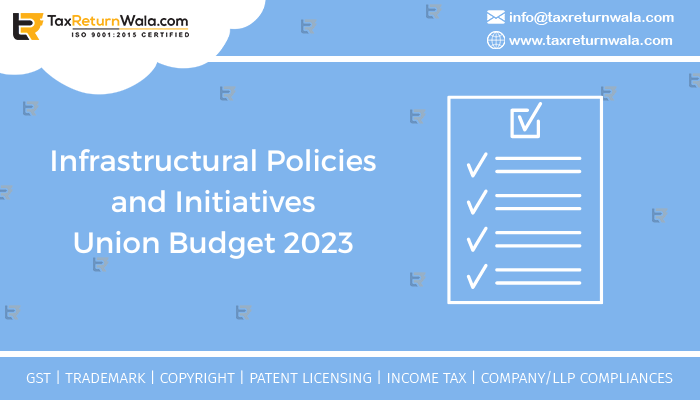Highlights of Industrial Policies and Infrastructure Development Initiatives undertaken in Budget 2023.
Infrastructural Policies and Initiatives Union Budget 2023 Highlights: Finance Minister Nirmala Sitharam on 1st February 2023 presented the Union Budget for the financial year 2023-24 in the Lok Sabha. While the major expectations from the budget were for some bigger reforms for the middle class – FM along with direct tax measures introduced some relieving measures to promote infrastructural spending for the inclusive development of the country.
Here is a list of changes and Infrastructural Policies and initiatives proposed in the Union Budget 2023:
Infrastructural Policies and Initiatives
- Additions to the Capital outlay made to the PM Awas Yojana of 79000 crores and for the development of Indian Railways with Rs 2.40 lakh crore.
- To ensure priority sector lending, an Urban Infrastructure Development Fund will be formed for public agencies ensuring urban infrastructure in TIER 2 and Tier 3 cities.
- 10000 Bio-Input Resource Centers will be formed to create awareness among farmers for natural farming.
- For industrial biogas consumption and usage 500 new Waste to Wealth plants under GOBARDHAN (Galvanizing Organic Bio-Agro Resources Dhan) scheme will be established.
- Digilocker facilities will be extended for MSMEs to store their documents online security and will set up 100 labs for 5G Service-based application development.
- The additional infusion of Rs 9000 crore in the MSME Credit guarantee scheme enables collateral-free loans to entities.
- CPC (Central Processing Centers) will be placed for easy compliance filling with field offices under the Companies Act.
- Aspirational Blocks Programme will be launched to cover 500 blocks for the extension of essential government services to different sectors and basic infrastructural development.
- PM PVTG Development mission will be introduced for the upliftment of SCs/STs.
- An outlay of 75000 crores is to be used for financing Transport infrastructural projects and a New Infrastructure Finance Secretariat is to be established for the inclusion of private investment in infrastructural plans.
- The transition of the manhole to machine hole mode for mechanical desludging of septic tanks and sewers, several measures shall be undertaken.
- To unleash innovation by startups and academia, a National Data Governance Policy will be formed.
- PAN to become a common identifier for most digital systems for availing services of government agencies by entities.
- Ensuring effective administration of law, Phase 3 of the E-Courts project shall be initiated.
- Grants for setting up an R&D lab for Grown Diamond Industry will be provided to reduce import dependency.
- To reduce dependency on fossil fuel imports, production of 5 MMT under the Green Hydrogen Mission will be targeted to achieve by 2030.
- A special outlay of 35000 crores for energy security, energy transition, and net zero objectives and 20700 for renewable energy grid integration and evacuation from Ladakh shall be granted.
- Unified Skill India Digital Platform will be launched for providing demand-based formal skills. entrepreneurship education and job opportunities linked with MSMEs.
- Direct Benefit Transfer under a pan-India National Apprenticeship Promotion Scheme will be introduced to support 47 lakh youth.
- Domestic travel facilities and tourism shall be promoted through the new 50 tourist destinations placed with a complete package for travelers to India with Dekho Apna Desh Initiative.
- For the promotion of village tourism and the sale of indigenous goods, the Vibrant Villages Programme and the concept of Unity Mall will be encouraged.
- A new legislative framework for establishing a central repository through National Financial Information Registry shall be established in consultation with RBI.
- Special measures shall be undertaken to enhance activities including the delegation of powers of SEZ Act to IFSCA, a single IT window-based registration format for IFSCA, SEZ, GSTN, RBI, SEBI, and IRDAI.
- Measures related to establishing an EXIM bank subsidiary for trade re-financing, amendment in IFSCA Act for arbitration and contradictions with SEZ Act, and improving the offshore derivative instruments for consideration as valid contracts shall be undertaken.
- Special regulation amendments shall be done through the Banking Regulation Act, and Reserve of India Act to improve banking governance and investor protection.
- Foreign investments through the establishment of Data Embassies in GIFT IFSC shall be promoted.
- To form an IT portal, to enable investors to reclaim their unclaimed shares and unpaid dividends from Investor Education and Protection fund Authority.
The above infrastructural policies introduced through the Union Budget 2023, provided a strong commitment of the Government towards the infrastructural changes required in the country to drive smooth economic growth. Overall, the 2023 budget’s infrastructural policies have the potential to embrace a positive impact on the nation for years to come.
Need to more details about Policies and Procedures?
Feel free to write to us at info@taxreturnwala.com


